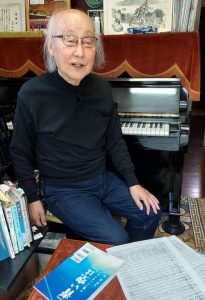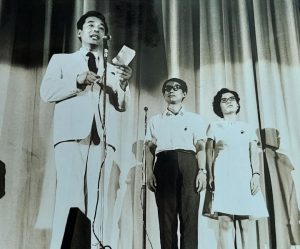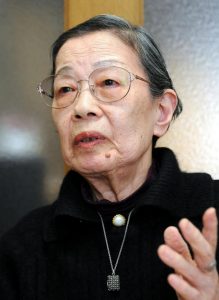An anti-nuclear life, Part 6: Kyoko Komori (poet, 1930–2023)
Jun. 26, 2024
“Blue and Clear Sky,” connecting to future generations
Transcending national borders, song represents wish for no more war
by Masakazu Domen, Senior Staff Writer
Among musical works involving the tragedy of the atomic bombings and anti-nuclear sentiments, “Blue and Clear Sky” in particular has been widely performed over the years. The song was composed in 1971 as part of the Singing Voice Movement in Japan, a campaign linked with the labor and peace movements that aimed to give people hope through music. The song, however, has since spread beyond that framework throughout the country and is now sung by children on what is known as Peace School Day, held during summer vacation.
Blue and clear sky we all hope to leave to our children as it is now
On that morning of August even shadows were burned up by the flash and heat
Dear father, dear mother, dear mother, dear brothers and sisters
We pray for your souls every day and every night
So long as we live
(from the song’s first verse)
The phrase “even shadows were burned up” is reminiscent of the “Human Shadow Etched in Stone” (an exhibit at the Peace Memorial Museum), in which the shadow of a person sitting on the stone steps of a bank’s entrance close to the Hiroshima A-bombing hypocenter is thought to have been etched into the stone by the bomb’s thermal rays. Although the words “atomic bomb” never appear in the song’s three verses, its lyrics are cleverly crafted to represent the bombing.
The lyricist, Kyoko Komori, was born in Tokyo. Her works were published in the poetry magazine Shijin Kaigi (in English, ‘Poets association’) and others, and she served as the magazine’s executive committee chair. She was also involved in the Japanese Society for the Protection of Children, a group aimed at attaining the rights of children as stated in the Children’s Charter and other legal frameworks.
Ms. Komori lived in the Tokyo metropolitan area, except for a period before and after the end of the war and during about four years starting in 1961 when she lived in the Czech Republic (then-Czechoslovakia) together with her family. However, through her song “Blue and Clear Sky,” she formed a strong bond with Hiroshima. It was in August 1971 on the stage at the 17th World Conference against Atomic and Hydrogen Bombs, held in Hiroshima City, that the newly completed song was performed.
“Blue and Clear Sky” materialized after the Japan Council against Atomic and Hydrogen Bombs (Gensuikyo) joined with Japan’s Singing Voice Executive Committee, the driving force behind the Singing Voice Movement, in calling for submissions of commemorative songs for the 17th conference.
Among music related to the atomic bombing, the 1954 song titled “Genbaku o Yurusumaji” (in English ‘Never allow another atomic bomb’), which begins with the lyrics “Our hometown was burned / Where we buried the ashes of the ones that we loved,” was already widely known at that time. Susumu Onishi, 92, composer of the “Blue and Clear Sky” who is a resident of Yokohama City, said, “As time passed after the end of the war, a song that could be sung with children, the next generation of those who experienced the war, was long overdue.” At the time, Mr. Onishi was working at the Ongaku (‘Music’) Center in Tokyo, in which was located the secretariat of the Singing Voice Executive Committee.
In March 1971, the Singing Voice Movement’s organizational newsletter called for song submissions, and three pieces, including Ms. Komori’s “Blue and Clear Sky,” were selected for their outstanding lyrics. At the audition of the pieces with musical accompaniment, “Blue and Clear Sky” won first place, resulting in its being sung vigorously.
According to her autobiography, Ms. Komori was hesitant at first to submit her work. “How on earth could I, someone who is not even an A-bomb survivor, try to approach such a theme?” she thought. However, she was inspired by her memories of Lidice, a village on the outskirts of Prague she had visited while living in the Czech Republic.
Lidice is known for the massacre of its residents by Nazi Germany. When she visited the village with her two children, an elderly female survivor of the massacre asked her whether she was Japanese and embraced her, saying that if so, she was a mother of Hiroshima. It was at that moment she realized “Hiroshima” had become part of the world’s lexicon.
“Blue and Clear Sky” begins with a common refrain contained in the first through third verses, followed by the different lyrics for each of the verses. Ms. Komori wrote in her book that the first verse, as well as the second verse depicting scenes of a lantern-floating ceremony, should be sung “with heartfelt prayers for the repose of the souls of the dead,” while she described her wish that the third verse be sung “boldly, cheerfully, and with a confident smile.”
Blue and clear sky we all hope to leave to our children as it is now
From the earth ending all wars in order not to take any lives
For peace, for live, for friendship of all
Let’s take hand in hand,
and sing songs of human heart
All friends over the world
(from the song’s third verse)
The phrase “From the earth ending all wars in order not to take any lives” implies not only an internationalistic sense, as if the song is referencing Lidice, but also suggests the pacifism inherent in the Preamble to Japan’s Constitution and its Article 9.
“There is no doubt that she put her feelings about the constitution into the song,” said Yoichi Komori, 71, her oldest son, decisively. Mr. Komori is professor emeritus (of Japanese literature) at the University of Tokyo and the chief of secretariat of the Article 9 Association, a citizens’ group that advocates for the protection of the Japan Constitution’s Article 9. “When I established the Article 9 Association with like-minded people in 2004, my mother thanked me for taking on the responsibility mentioned in the third verse of the song,” he recalled.
Blue and clear skies should be passed on to children. Singers of the song can express their own hopes in the first few words of the refrain, which leave a vivid impression. What is certain is that the image of a blue and clear sky includes a breadth that transcends national borders and stands in direct opposition to wars waged by nations.
Kyoko Komori
Born in Toshima Ward, Tokyo, Ms. Komori experienced the Great Tokyo Air Raid and was in Shiga Prefecture, where she had been evacuated, when World War II ended. In 1961, when her husband was transferred to the headquarters of the World Federation of Trade Unions, which was then located in Prague, she accompanied him with their two young children. In 1965, the family returned to Japan. In addition to poetry, she wrote novels and essays, and her 2009 poetry collection Ikiruto-wa (‘What is life’) won the Tsuboi Shigeji Award. “Blue and Clear Sky” has been translated and sung in Vietnamese, English, French, and other languages.
(Originally published on June 26, 2024)










